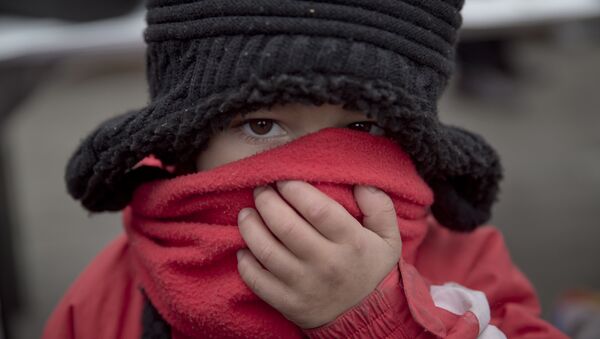Official statistics tell one story but some primary schools in England are operating as a first response unit to children growing up in poor households in Britain.
Teachers, headteachers and support workers admit to handing out shoes and coats to children shivering in the cold weather and allowing parents to charge their cellphones in classrooms because they don't have sufficient electricity at home.
Primary schools with washing machines to wash children's uniforms, where teachers charge parents phones who have no electricity, and give coats, shoes and food to their pupils. The GP who is treating kids for rickets. This is the poverty we have found in the North West in 2017. pic.twitter.com/Onu1C01JWw
— Daniel Hewitt (@DanielHewittITV) December 12, 2017
But even that's too expensive for some children.
Widespread Issue
The interview with the school prompted people to turn to Twitter to tell their own story, including another teacher:
"I have brought home six school jumpers belonging to my years sixes. They haven't been washed in a while. I've washed them, ironed them and will leave them in the classroom tomorrow but won't say anything. The kids may suspect but I'll keep mum."
I have brought home six school jumpers belonging to my year sixes. They haven't been washed in a while. I've washed them, ironed them and will leave them in the classroom tomorrow but won't say anything. The kids may suspect but they'll keep mum.
— Wandering Aeonghus (@WAeonghus) December 12, 2017
"I've been around local charity shops today to buy a dozen books for our class library My students love reading but can't afford their own books."
Every school is packed with people like me; caretakers, teaching assistants, dinner ladies, lunchtime supervisors, office staff, teachers……we all have a positive role to play in helping out children become the positive and resilient citizens of tomorrow.
— Wandering Aeonghus (@WAeonghus) December 12, 2017
Meanwhile the Office for National Statistics (ONS) has revealed a fall in unemployment which declined by 26,000 to 1.43 million; the jobless rate remained at 4.3%, the lowest rate since 1975.
The UK unemployment rate for August to October 2017 remained at 4.3%. This is down from 4.8% from the previous year, and is the joint lowest rate since 1975: https://t.co/yBGyWFrAdw pic.twitter.com/4xsiaRlcwU
— ONS (@ONS) December 13, 2017
The Conservative government was quick to take credit.
The latest statistics released by the ONS today show that the Conservatives have helped businesses create 1,000 jobs every day — meaning more people with the security of a regular pay packet. pic.twitter.com/4aayXVx5OK
— Conservatives Group (@ConservativesGE) December 13, 2017
— Conservatives (Conservatives) December 13, 2017
However, it's a different kind of credit that has prompted more stories of genuine hardship told on Twitter.
#Thread by a barrister on the devastating impact #UniversalCredit has caused her client comes a day after publication of @NHC's damning study into its impact on housing organisations & their tenants in the North. https://t.co/8GNP3JnNLm https://t.co/ULW2bu2sKO
— Stefan Simanowitz (@StefSimanowitz) December 13, 2017
Universal Credit
Universal Credit is the government's new welfare program which has been rolled out across the UK.
https://t.co/LDAIG0KEsY #UniversalCredit This breaks my heart who can watch this & NOT be moved to tears #FrankField #HeidiAllen
— julie anne⚘ (@stoneyrocks) December 8, 2017
Instead of individuals or families applying for separate benefits — such as income support, jobseekers allowance, child tax credits or housing benefit — one single payment will be paid directly into claimant's bank accounts to cover the benefits they would usually be entitled to. Universal credit is based on how much money you earn each month.
A recent report by Joseph Rowntree Foundation suggested almost 400,000 more children are living in poverty today than in 2012/13.
Changes to welfare policy since the 2015 Budget "are reducing families' financial breathing space, with wage growth at the bottom end of the labour market failing to make up the difference," the report stated.
Commenting on the ONS figures, Debbie Abrahams MP, Shadow Work and Pensions Secretary said:
"Today's figures are further evidence of Tory economic failure, only a day after inflation rose to its highest level in over five-and-half years. Eight million people in working households live in poverty, and many will struggle this Christmas as a direct result of this government's austerity policies."



